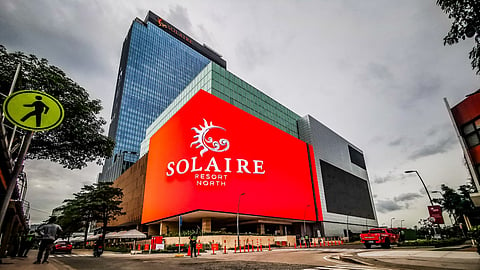
- NEWS
- the EDIT
- COMMENTARY
- BUSINESS
- LIFE
- SHOW
- ACTION
- GLOBAL GOALS
- SNAPS
- DYARYO TIRADA
- MORE

Solaire Resort, Newport World Resorts, and Okada Manila have reaffirmed their commitment to ethical business practices and responsible gaming, following news that the Marcos administration is considering stricter rules on online gambling.
The integrated resort operators released a statement on Sunday stressing that their online gaming platforms are regulated by the Philippine Amusement and Gaming Corporation (PAGCOR) and are run with strict adherence to transparency, compliance, and integrity standards.
“As integrated resorts, our core focus remains on delivering world-class hospitality, entertainment, and leisure experiences. Our online gaming operations are a regulated and responsibly managed extension of our operations — designed to complement our primary offerings,” the statement read.
The companies issued the statement days after President Ferdinand Marcos Jr. expressed concern over online gambling addiction and the impact on Filipino families. The Palace earlier said it is reviewing proposals to raise taxes on online gambling and impose tighter restrictions, including regulating influencer marketing related to betting platforms.
Solaire, Newport, and Okada said they are fully licensed by PAGCOR and have implemented strict geo-fencing and IP-filtering technologies to ensure access to their platforms is limited to players within the Philippines.
The resorts also highlighted their full compliance with anti-money laundering laws, including Know-Your-Customer (KYC) protocols and player verification within 72 hours of registration. Underage users are blocked through age-gating systems, while gaming equipment is approved by PAGCOR to ensure fairness and transparency.
Responsible gaming tools — including self-exclusion options, deposit limits, and access restrictions — are also built into the platforms. Promotional materials are reviewed by PAGCOR and the Advertising Standards Council, while all employees undergo annual compliance training.
Beyond legal requirements, the resorts said they conduct regular audits, content reviews, and offer internal dispute resolution mechanisms to further strengthen accountability.
Meanwhile, PAGCOR Chairman Alejandro Tengco cautioned against an outright ban, arguing that it would not only be difficult to implement but could also do more harm than good.
Tengco said authorities are currently able to monitor only about 45 to 50 percent of online gambling activity. The rest, he warned, exists in a digital gray area often run by offshore operators targeting local users.
“What’s really destroying the industry today are the illegal operators coming from other countries who are targeting Filipino customers,” Tengco said. “That’s what is currently destroying the well-regulated online gaming industry regulated by Pagcor.”
He warned that pushing the industry further underground would undermine regulation and cost the government significant revenue. In 2024 alone, PAGCOR generated P50 billion from license fees, with a single gaming firm accounting for as much as P40 billion.
“The effect of this is that our country could potentially lose hundreds of billions in revenue if the total ban is enacted,” Tengco said. “What we need is strict regulation to manage the industry while ensuring government income.”
Tengco also noted that thousands of Filipinos could lose their jobs across the hospitality and service sectors should a ban be implemented.
However, Interior Assistant Secretary Florencio Valeriano dismissed the revenue argument as “immaterial,” saying that no financial gain justifies the social toll of gambling, especially among the poor.
“When POGO was totally banned, we saw all the underlying problems come out. That’s what will happen also to online gaming,” Valeriano said. “Give us another two to three years without banning it, and we would face another major problem again.”
He added: “What’s the difference between illegal and legal? Either way, people will still spend money — it’s still gambling.”
Technology consultant Atty. Tonet Quiogue also weighed in on the issue, warning that a blanket ban would strip the government of its ability to regulate the industry and control illegal operations. In a 15-page memo, Quiogue emphasized that illegal gambling—not regulated platforms—is the real threat.
“If the goal of lawmakers is to eliminate the social ills of gambling, then the logical approach is to surgically strike at these illicit operations, not to outlaw the entire industry and penalize legitimate stakeholders,” she wrote.
As part of its broader regulatory push, PAGCOR has ordered the removal of all billboard and out-of-home (OOH) advertisements promoting gambling. In a memorandum dated 7 July, the agency directed all gaming licensees and operators to dismantle gambling-related ads from public spaces including trains, buses, taxis, and jeepneys.
PAGCOR Chairman Tengco said the move aims to protect vulnerable groups, especially the youth, from the influence of excessive gambling promotions. Only institutional or responsible gaming campaigns—subject to PAGCOR’s approval —will be allowed going forward. Stakeholders have until 15 August to comply with the directive, with an inventory of existing ads due by 16 July.
“While PAGCOR is mandated to regulate the gaming industry and generate revenues for nation-building, we do not want to encourage a culture of gambling addiction,” Tengco said.
The agency also warned against replacing dismantled ads with new gambling promotions, stating that violations will be penalized accordingly.
